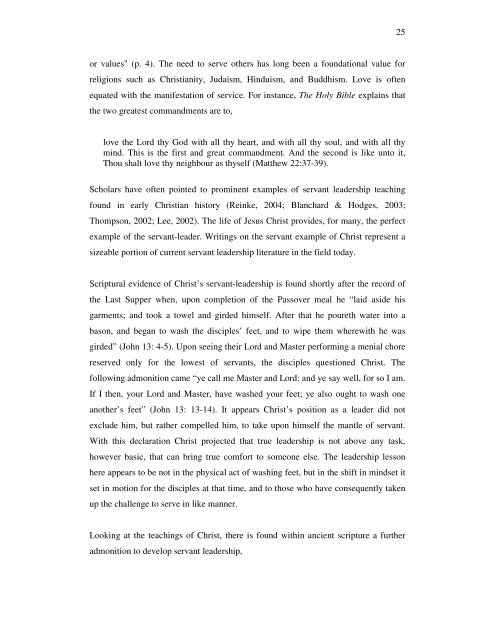nurturing servant leaders in religious education - Scholarly ...
nurturing servant leaders in religious education - Scholarly ...
nurturing servant leaders in religious education - Scholarly ...
Create successful ePaper yourself
Turn your PDF publications into a flip-book with our unique Google optimized e-Paper software.
or values" (p. 4). The need to serve others has long been a foundational value for<br />
religions such as Christianity, Judaism, H<strong>in</strong>duism, and Buddhism. Love is often<br />
equated with the manifestation of service. For <strong>in</strong>stance, The Holy Bible expla<strong>in</strong>s that<br />
the two greatest commandments are to,<br />
love the Lord thy God with all thy heart, and with all thy soul, and with all thy<br />
m<strong>in</strong>d. This is the first and great commandment. And the second is like unto it,<br />
Thou shalt love thy neighbour as thyself (Matthew 22:37-39).<br />
Scholars have often po<strong>in</strong>ted to prom<strong>in</strong>ent examples of <strong>servant</strong> <strong>leaders</strong>hip teach<strong>in</strong>g<br />
found <strong>in</strong> early Christian history (Re<strong>in</strong>ke, 2004; Blanchard & Hodges, 2003;<br />
Thompson, 2002; Lee, 2002). The life of Jesus Christ provides, for many, the perfect<br />
example of the <strong>servant</strong>-leader. Writ<strong>in</strong>gs on the <strong>servant</strong> example of Christ represent a<br />
sizeable portion of current <strong>servant</strong> <strong>leaders</strong>hip literature <strong>in</strong> the field today.<br />
Scriptural evidence of Christ’s <strong>servant</strong>-<strong>leaders</strong>hip is found shortly after the record of<br />
the Last Supper when, upon completion of the Passover meal he “laid aside his<br />
garments; and took a towel and girded himself. After that he poureth water <strong>in</strong>to a<br />
bason, and began to wash the disciples’ feet, and to wipe them wherewith he was<br />
girded” (John 13: 4-5). Upon see<strong>in</strong>g their Lord and Master perform<strong>in</strong>g a menial chore<br />
reserved only for the lowest of <strong>servant</strong>s, the disciples questioned Christ. The<br />
follow<strong>in</strong>g admonition came “ye call me Master and Lord: and ye say well, for so I am.<br />
If I then, your Lord and Master, have washed your feet; ye also ought to wash one<br />
another’s feet” (John 13: 13-14). It appears Christ’s position as a leader did not<br />
exclude him, but rather compelled him, to take upon himself the mantle of <strong>servant</strong>.<br />
With this declaration Christ projected that true <strong>leaders</strong>hip is not above any task,<br />
however basic, that can br<strong>in</strong>g true comfort to someone else. The <strong>leaders</strong>hip lesson<br />
here appears to be not <strong>in</strong> the physical act of wash<strong>in</strong>g feet, but <strong>in</strong> the shift <strong>in</strong> m<strong>in</strong>dset it<br />
set <strong>in</strong> motion for the disciples at that time, and to those who have consequently taken<br />
up the challenge to serve <strong>in</strong> like manner.<br />
Look<strong>in</strong>g at the teach<strong>in</strong>gs of Christ, there is found with<strong>in</strong> ancient scripture a further<br />
admonition to develop <strong>servant</strong> <strong>leaders</strong>hip,<br />
25

















